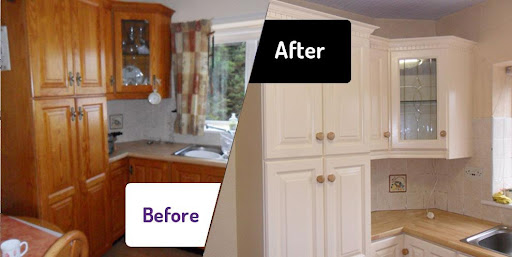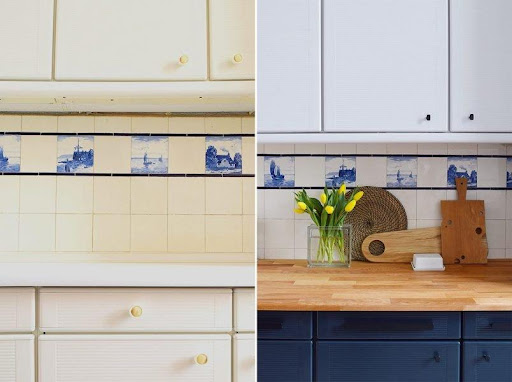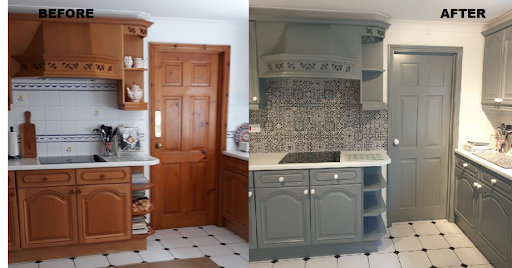Changing the colour of your kitchen cupboard doors can instantly transform your space. If you feel like this is a job you can complete yourself at home, then you would be right – there is no need to hire a professional. However, depending on the material your doors are made from, it can be difficult to achieve a perfect finish. To help, we’ve put together a simple guide to painting your kitchen cupboard doors to ensure you get the finish you want.
1. Remove handles and hinges
The first step you need to take when painting any kitchen cupboard doors is to remove the handles and hinges attached to them. This will leave you with a bare door to prepare to be painted. Removing the hinges enables you to place the door elsewhere away from the cupboard to be painted, and removes the risk of damaging the cupboard by trying to paint with the door still attached.
If you want to paint the interior/exterior of the cupboard then be sure to remove the contents of the cupboard. Also, ensure that the remaining hinges are covered with masking tape to protect them from being painted.
2. Wash and sand cupboards
If you have painted the kitchen cupboard door before then it is advised to sand down the doors before preparing them for painting. To avoid damaging the doors try using 120 to 220 grit sandpaper. Using a fine sandpaper like this will smooth out the imperfections in the wood and prepare the surface to be painted.Some cupboards can be tricky to sand due to uneven surfaces and ridges. A tip to sand these areas is to wrap sandpaper in something mouldable, such as a sponge, and use that to sand down the door. When painting over gloss or non-wooden cupboard doors this step is not required.

3. Selecting a primer
Next, once your kitchen door has been sanded down (if required) you need to apply a primer to the cupboard. This is particularly necessary with wooden doors as it stops the grain from showing up through the paint.
Shellac-based primers are recommended for kitchen cupboards because they dry quickly. Try using a small roller for this job to ensure smooth coverage. Usually, the first coat of this type of primer dries within 45 minutes and shellac primers are also good at covering the grain and any knots if your door is wood.
4. What paint to choose?
As the kitchen is the central hub of the home, it is a well lived in space and so the cupboards need to be durable. Semi gloss, gloss or satin are favoured for kitchen cupboards because they not only provide a quality finish, but they are also wipeable and hard-wearing – opposed to matt painted doors which are just impractical in the kitchen.The paint colour you select will be highly dependent on the style of kitchen and atmosphere you want to create. Kitchen cupboards are usually a dominant part of the room and so the colour you select will have a big impact. Colourful cupboards can really make your room stand out, particularly against a white or black wall. However, it can be simpler to match your cupboards to the room to create a consistent look. Essentially, the kitchen design you choose you will have to live with everyday so think carefully about your choice.
5. How to paint over gloss
Painting over glossy doors requires a slightly different primer to wooden surfaces. Use a super grip primer for glossy surfaces, these will stick to the cupboard door better than other primers. These primers usually only require one coat but may take longer to dry, so be sure to account for this. Make sure your door is cleaned of any grease, some sugar water is sufficient to wipe down your surfaces beforehand.

6. Spraying or respraying
This may seem like the quickest option when it comes to painting or repainting your kitchen cupboards, but it can be the most tricky. First, you need to cover up the entire space with plastic sheets. It may sound obvious but paint sprayers use a fair amount of air to spray paint onto surfaces. As a result, things like dust and general dirt can be blown onto your kitchen cupboard door which can leave a less than desirable finish. The chances of this happening are quite high so have a roller on hand to even out the paint and give your doors a smooth finish.Tip: Two coats should be the minimum amount you aim for to avoid a patchy or uneven finish.

7. Should disaster strike
If disaster strikes and the finish does not turn out to your liking, there is always the option to start again with a new set of kitchen cupboard doors. With a huge range of vinyl, acrylic and solid wood doors on the market, you are sure to find something to suit your fancy. If not though, we offer a range of paintable styles for all budgets, which can be used from the start if you have a paint finish you have fallen in love with. Finally, you may already have cupboards that just need a fresh lick of paint. However, instead of repainting them you could treat yourself to a completely new set from Lark and Larks. Get in touch with us to see how we can transform your kitchen or bedroom.


